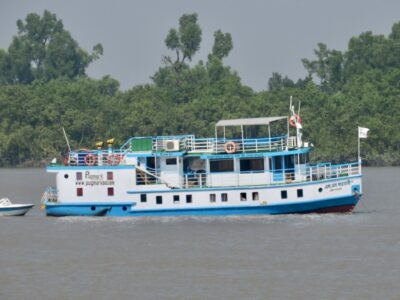
Sara Kaddoura (MPA-ESP Class of 2017) is currently a product developer with the Loreal-Kiehl sustainability program, ‘Sharing Beauty With All’.
Before coming to Columbia’s School of International and Public Affairs (SIPA), Sara completed a double major in Environmental Health and Economics from the American University of Beirut. She also interned with the United Nations, once for Human Rights, working with victims of torture and Syrian refugees, and once with the United Nations Framework Convention on Climate Change as a research assistant for the Conference of Parties in Peru. MPA-ESP intern Shagorika Ghosh speaks with Sara about sustainability, her experience at SIPA and more.
How did you get interested in environmental science and policy?
I went to high school in Qatar, but I am Lebanese. I completed my undergraduate degree at the American University of Beirut, where I was also president of the UNESCO Club, where we did a lot of philanthropic work centered around environmental causes.
The Lebanese trash crisis was one issue that led to my interest in policy issues, as their landfills are full and trash management in the country is inefficient and will require a comprehensive solution.
What made you choose the MPA-ESP program at Columbia University?
I was very intrigued by the MPA-ESP at SIPA—it was a beautiful marriage of policy, international affairs and science. I liked that the program required you to develop a strong foundation of science to be able to implement policy. One of the greatest advantages of being at Columbia was also that it is located in New York City. There are so many opportunities, such as having the UN headquarters nearby.
What were the best parts of your SIPA experience?
The professors who taught at SIPA were one of the best parts of the great Columbia experience. These were people who knew what they were talking about. My favorite faculty were ones that had worked in the environmental field, and so they brought their extensive, specific expertise to the classes they taught.
Our coursework was relevant to the challenges we face today. In our MPA ESP core class, Workshop in Applied Earth Systems Management, I was the manager for my Spring Semester workshop, where we worked on a bill on brownfields that was already in Congress. As part of our course curriculum, we worked with the Sierra Club as a client, and developed a model for accounting for upstream emissions of oil and gas in the US. We were also actively trying to reach out to the Congressman who could pass it. In one of my elective courses, ‘Financing the Green Economy’, one of our assignments was to offer recommendations on how to design a solar model for Nigeria.
As part of my extracurricular activities, I was involved in the Columbia Impact Investing Initiative (CI3), where we worked with a pilot program for Syrian refugees in Washington DC. Working on that was a good way for me to contribute given my background, and I was able to develop more skills as well. Apart from that, I was vice-president of my class and took that opportunity to communicate with people across SIPA through SIPASA.
Our interactions within my own ESP cohort were wonderful. We are very close and are still in touch. Everyone works in different fields within the larger umbrella of sustainability, so it’s also a great way to keep abreast of all of the new developments in these different fields.
What were some of the opportunities you explored outside of SIPA?

Outside of SIPA, I interned with the United Nations with the UN Afghan Mission. As part of my role I attended the UN General Assembly and worked on environmental and human rights issues.
I was also associated with two NGOs. One was Art of Hope, which raises funds for Syrian refugees in Lebanon; and the other was SEAL, through which you can sponsor welfare programs in Lebanon.
What skills did you develop at SIPA that have been helpful in your current role?
Communication skills were one of the most important skills I developed when I was at SIPA. The diversity at SIPA plays a critical role—I developed an ability to communicate with people from diverse backgrounds and sectors. It taught me to be adaptable and comfortable with any new environment I was in. The workshop class also gave me experience in how to deal with real world problems and stakeholders, as well as time management skills.
How did you get your current job?
Actually, it was on the Earth Institute blog State of the Planet, that I saw this really interesting interview with Tara Helms, a former Columbia University student who was working at Loreal. It struck me as fascinating—someone who had studied sustainability was now working in the cosmetics industry. So I contacted Tara through LinkedIn, and asked to speak with her. It was in the course of our conversation that she told me about the open position. So I went in for an interview and then later joined Loreal full-time. This was unexpected and a change of direction from my original focus on the international affairs at UN, but keeping an open mind to new opportunities is an important part of being a student at Columbia University.
Could you expound on the sustainability work that Loreal is doing? What is your role in the sustainability program?
I currently work as a developer at Loreal, where my responsibilities include incorporating sustainability practices at every level of the supply chain. One of our current projects is replacing all of the current bottles and tubes with containers made from recyclable material. Loreal, as part of its 2020 sustainability initiative, has committed to reducing emissions by 60 percent, and we are well on the way to accomplishing that. We are also working on creating awareness about sustainability within the company as well, especially among employees who may not have a background in sustainability, to be more aware of what they can do to contribute to the environment and Loreal’s sustainability initiative.

Working at Loreal has been a great learning experience. I have had the opportunity to see firsthand how much positive impact a corporate can have with sustainability. There are also several SIPA alumni working in the cosmetic industry at companies like Loreal, Revlon and Estee Lauder.
What advice would you give to current and prospective students?
Diversifying my electives was one of the best things I did. It allowed me to have a full, more comprehensive understanding of environmental policy because I wanted to keep in mind the financial, social and political perspectives as well. Taking all these different classes enables you to be well-versed in and comfortable with different sectors and stakeholders.
I would also recommend going to as many events as possible. It is great to build up a network. It doesn’t necessarily have to be networking for a job, but it is good to get to know alumni and others in the field, because you never know how that might help later on.



